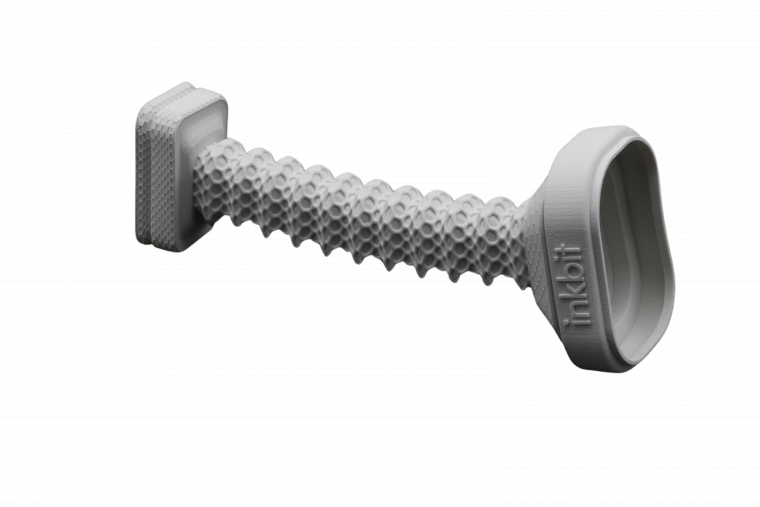Empowering manufacturers to 3D print elastic components that require sealing, accuracy and design freedom
´Inkbit™, a pioneer in advanced additive manufacturing solutions announces today, at Formnext, 2023, the availability of its new TEPU 50A elastomer. TEPU 50A is a thiol-ene polyurethane-based elastomer with a Shore 50A durometer and low compression set that offers excellent UV stability and strong chemical compatibility. TEPU 50A is the latest addition to the Inkbit Vista™ ecosystem, developed in response to customer requests for a Shore 45-55A elastomer that could accurately produce intricate detail in a wide range of geometries with excellent surface finish and elastic resilience.
TEPU 50A is the second elastomer to be offered by Inkbit and follows TEPU 30A (formally known as the Vulcan Soft Elastomer 30). Ideal for demanding applications that require a medium-soft shore hardness and optimal sealing and compression attributes. TEPU 50A is an excellent choice for replacing or prototyping soft rubber components, silicones, or molded TPUs that require precision and detailed features. Its suitability extends to various applications, including grommets, window and door seals, soft grippers, gaskets, and similar soft elastic components.
The new elastomer is not only a response to technical specifications but also addresses the real-world challenges faced by manufacturers when sourcing low-volume rubber-like components. Maximilian Neck, CEO of ProductionToGo, shared his enthusiasm for this new material solution: “Sourcing low-volume rubber-like components is a constant challenge for organizations. Traditional methods are expensive in small quantities and can take several weeks or months to procure, directly impacting overall production timelines,” said Neck. “Before TEPU 50A, we couldn’t find a soft 3D printed elastomer option that combined good surface finish accuracy, fine detail reproduction, and stable mechanical properties to mimic nitrile rubber or molded TPU. We are excited about having this option available.”
“TEPU 50A is the culmination of years of chemistry and process development driven by customers searching for an alternative to molded or cast silicones and rubbers for prototyping and beyond,” said Inkbit Co-Founder and CEO Davide Marini. “Our novel thiol-ene polyurethane-based chemistries enables us to print soft but resilient elastomers that are UV stable and have excellent chemical compatibility.”
Due to their high viscosity, chemistry limitations, and printing difficulties, typical commercially available 3D-printed elastomers on other technologies are challenging to print with, and the finished part properties degrade quickly under UV exposure. TEPU 50A’s part properties are highly stable due to a powerful thiol-ene chemical reaction during the print process, and Inkbit’s unique Vision Control Jetting (VCJ) with closed-loop feedback control ensures that parts are built quickly and accurately every time.
Outstanding elastomeric performance
In developing TEPU 50A, Inkbit targeted properties similar to those found in nitrile rubber and silicone applications in automotive and various other industrial applications where flexibility, sealing, and surface quality were critical.
Key attributes in TEPU 50A include:
7.7% Compression Strength Set (23°C, 72 h).
49A Shore Hardness.
128% Elongation at Break.
-28°c Glass Transition Temp (DSC-Tg).
9.4% change in Elongation at Break after 1000 hrs. of UV aging.
0.3% weight gain after 5 days submerged in engine oil.

 Deutsch (Germany)
Deutsch (Germany)  Polski (PL)
Polski (PL) 









